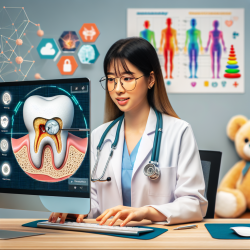Traumatic dental injuries (TDIs) are common among children and adults, often leading to significant functional, aesthetic, psychological, and social issues. Given that emergency departments (EDs) are frequently the first point of contact for trauma patients, it is crucial that emergency physicians possess adequate knowledge to manage these injuries effectively. A recent study titled "Knowledge of Emergency Physicians about the Management of Traumatic Dental Injuries: A Cross-sectional Study in Northern Iran" provides valuable insights into this area.
In this cross-sectional study, Assadi et al. (2022) evaluated the knowledge of emergency medicine specialists, residents, and general practitioners (GPs) working in EDs about the management of TDIs. The study found that while emergency medicine specialists had a good level of knowledge (71.5%), residents and GPs exhibited only average knowledge (75% and 93.4%, respectively). Notably, none of the participants had a low level of knowledge.
Key findings from the study include:
- A significant association between physicians' knowledge and their job position (P<0.001).
- No significant differences between gender and history of participating in dental trauma courses with the level of physicians' knowledge (P>0.05).
These results highlight the need for targeted training programs to improve the knowledge of emergency medicine residents and GPs. Here are some actionable steps that practitioners can take to enhance their skills in managing TDIs:
1. Participate in Specialized Training Programs
Emergency physicians should seek out and participate in training programs specifically focused on the management of TDIs. These programs can provide practical, hands-on experience and up-to-date knowledge, which are crucial for effective management.
2. Implement Regular Knowledge Assessments
Hospitals and medical institutions should implement regular assessments to gauge the knowledge of their emergency staff regarding TDIs. These assessments can help identify knowledge gaps and provide a basis for targeted educational interventions.
3. Foster Interdisciplinary Collaboration
Encouraging collaboration between emergency physicians and dental professionals can enhance the overall management of TDIs. Joint workshops, seminars, and case discussions can provide valuable insights and foster a more integrated approach to patient care.
4. Utilize Online Resources and Continuing Education
Online platforms like TinyEYE offer valuable resources and continuing education opportunities that can help emergency physicians stay updated on the latest practices in managing TDIs. Leveraging these resources can significantly improve patient outcomes.
In conclusion, the study by Assadi et al. underscores the importance of improving the knowledge of emergency physicians regarding the management of TDIs. By participating in specialized training programs, implementing regular knowledge assessments, fostering interdisciplinary collaboration, and utilizing online resources, practitioners can enhance their skills and provide better care for patients with TDIs.
To read the original research paper, please follow this link: Knowledge of Emergency Physicians about the Management of Traumatic Dental Injuries: A Cross-sectional Study in Northern Iran










